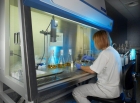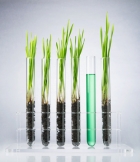Press monitoring
Commercial-scale biomanufactured melatonin is here
19.4.2023 | Press monitoring
For the first time, large amounts of melatonin are being made by bacteria. In industrial sized fermentation vats, harmless strains of engineered E. coli bacteria are feeding on glucose and churning out melatonin, the hormone that controls circadian rhythms and serves as a sleep aid. This large-scale production of pure melatonin by bacteria is one...
Swiss Army knife bears reveal anti-blood-clotting secret
17.4.2023 | Press monitoring
If you've ever taken a long airplane ride, you've no doubt heard that you should get up and move periodically to avoid developing blood clots. That's because when our bodies are stationary for long periods of time, the odds of our blood pooling, coagulating, and clotting go up. Yet bears can spend months in the same position in their caves...
A protective probiotic blunts the ill effects of alcohol in mice
14.4.2023 | Press monitoring
Excessive alcohol consumption leads to painful hangovers and accompanying headaches, fatigue and nausea. Drinking alcohol has also been linked to a raft of health problems in the human body, including heart disease, cirrhosis and immune deficiency. One way to avoid those consequences would be to drink less, but researchers in China have...
Multifunctional electronic patch offers early detection of plant diseases, other crop threats
12.4.2023 | Press monitoring
Researchers from North Carolina State University have developed an electronic patch that can be applied to the leaves of plants to monitor crops for different pathogens – such as viral and fungal infections – and stresses such as drought or salinity. In testing, the researchers found the patch was able to detect a viral infection in tomatoes more...
Super-sized nanocage could deliver bigger drug cargoes
10.4.2023 | Press monitoring
Nanocages are tiny artificial containers that can be used to deliver therapeutics to a target destination in the body. But some drug molecules are like gifts that are too big for a standard-sized nanocage "box.“ Now researchers from the University of Cambridge describe how they have built a super-sized nanocage that could be used to deliver...
New type of genetically-engineered T-cell may destroy solid cancer tumors
7.4.2023 | Press monitoring
Cancer cells are notorious for evading detection by the body’s immune system, making them difficult to treat. But a promising new type of genetically engineered T-cell that can effectively destroy solid cancer tumors may be just what the doctor ordered. Now, researchers from the Peter MacCallum Cancer Center in Australia have tested the...
Nanoparticle with mRNA appears to prevent, treat peanut allergies in mice
5.4.2023 | Press monitoring
Peanut allergies affect 1 in 50 children, and the most severe cases lead to a potentially deadly immune reaction called anaphylactic shock. Currently, there is only one approved treatment that reduces the severity of the allergic reaction, and it takes months to kick in. A group of UCLA immunologists is aiming to change that. Taking inspiration...
What should we call evolution driven by genetic engineering? Genetic welding, says researcher
3.4.2023 | Press monitoring
With CRISPR-Cas9 technology, humans can now rapidly change the evolutionary course of animals or plants by inserting genes that can easily spread through entire populations. Evolutionary geneticist Asher Cutter proposes that we call this evolutionary meddling "genetic welding." In an opinion paper published March 28 in the journal Trends in...
New nanoparticles can perform gene-editing in the lungs
31.3.2023 | Press monitoring
Engineers at MIT and the University of Massachusetts Medical School have designed a new type of nanoparticle that can be administered to the lungs, where it can deliver messenger RNA encoding useful proteins. With further development, these particles could offer an inhalable treatment for cystic fibrosis and other diseases of the lung, the...
Sugar-powered teabag-like implant successfully manages type 1 diabetes
29.3.2023 | Press monitoring
Glucose fuel cells that can effectively harness the body’s chemical energy and turn it into an electrical charge has been a long-term holy grail for scientists since such potential was first studied back in 1968. But these biotech batteries have been challenged by an array of biocompatibility issues for almost as long. Now, a team of researchers...































